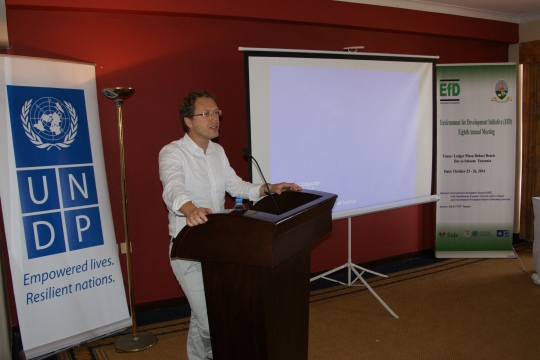Will gas and minerals bless or curse Tanzania and other natural resource rich countries in Africa? “Transparency is crucial to avoid devastating scenarios. Governments should publish all revenues, whereas firms should publish all payments they make to governments for natural resources. So the people can judge whether revenues are used for sustainable development,” said Professor Ola Olsson, University of Gothenburg, in his key note speech at EfD Policy Day in Tanzania Oct 22, 2014.
Tanzania has gas resources, Kenya and Uganda have oil, South Africa has diamonds. Many African countries are currently experiencing a dramatic increase in natural resources revenues. How this natural wealth can build sustainable growth and independence in the long run and benefit the people, not only the elite, is a central theme in the research agenda of Ola Olsson, Professor of Development Economics at the School of Business, Economics and Law, University of Gothenburg, Sweden. He gave a keynote speech on Political Economy of Natural Resource Exploitation at the EfD Policy Day 2014 arranged by the Tanzanian EfD center of the Environment for Development, an initiative run by the University of Gothenburg and funded by the Swedish International Development Agency and the World Bank.
“If the current strong growth and increasing incomes make natural resource rich countries in Africa totally dependent on international prices, what will happen to their economic independence when prices fall? Just as important are current foreign investments. China is becoming more influential politically in African countries. This could potentially in the long run have implications for how independent these countries are,” said Ola Olsson, and he emphasized that these questions are not purely economic. The development will largely depend on politics and politicians in African countries.
Natural resources exploitation is associated with environmental hazards and health hazards for people working with extraction. It is also well known that natural resource wealth easily leads to corruption, rent seeking, secret trade deals, political competition to control the huge flows of revenues, and also fighting and civil wars. International prices, foreign investments and trade deals are all factors affecting the political development of countries depending on natural resources:
“China is in need of minerals and oil and invests heavily in African countries, actually buying up land and mines. So does European countries. But China never asks questions about human rights. China makes a point of not interfering with other countries’ internal affairs. China does not encourage transparent trade deals. I think this can be potentially dangerous. To avoid future scenarios like the one in the Democratic Republic of the Congo, African governments should learn from successful natural resource countries, like Norway, and increase the transparency of revenues. People must know what is going on and be free to critically assess things. Increased transparency and democracy are key for sustainable growth, and the base for people to create new innovations,” said Ola Olsson.
He emphasized the importance of international initiatives such as the Extractive Industry Transparency Initiative (EITI). It builds on the idea that government politicians should tie their hands to be open about revenues by officially publishing all revenues they get from natural resources, whereas firms publish all the payments they make to governments for natural resources.
As a consultant for the World Bank, Ola Olsson studied the effects of Zambia’s dependence on copper exports. Olsson has also studied how diamonds affect conflict intensity and civil wars in Sierra Leone, Angola, Liberia and the Democratic Republic of Congo. So called conflict minerals like coltan (vital material for mobile phones), cassiterite, wolfram and gold are generally believed to drive the civil war in DR Congo, in which more than five million people have died since 1997. Since 2010 a new legislation in the US affects all companies that want to trade shares at the American stock exchange markets. Any export from conflict areas in DR Congo and all neighboring countries must be documented, meaning that all firms have to document where they have received their minerals. This has had a big impact on the global electronic industry. The legislation is one important focus of a Master program in Economics, entitled International Administration and Global Governance, and run by three departments at University of Gothenburg: Economics, Political Sciences and Global Studies.
By Karin Backteman
References to publications by Ola Olsson:
Olsson, O. (2011) ”Är förbannelse bruten?” Internationella Studier, höst, s 52-55.
Olsson, Ola (2006) "Diamonds Are a Rebel's Best Friend" The World Economy 29(8):1133-1150
Dalgaard, C-J and O. Olsson (2008) "Windfall Gains, Political Economy, and Economic Development" Journal of African Economies 17, Suppl. 1, 72-109
For more information please contact Ola Olsson, Professor of Development Economics
Tel: +46 (0)31-786 1341, Mobile: +46 766 181341: Email: ola.olsson@economics.gu.se, www.economics.handels.gu.se/english/staff/professors/ola_olsson/
